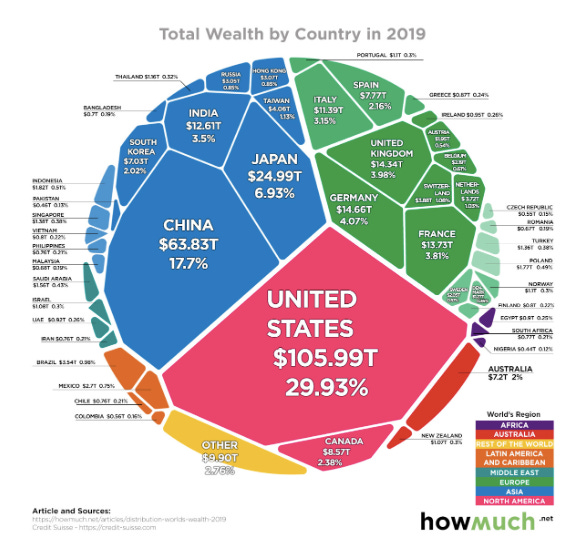Today’s Contemplation: Collapse Cometh CXCVII–‘Renewable’ Energy: See, Hear, and Speak No Evil, Part 3

In attempting to bolster the mass rollout of supposed ‘clean/green/sustainable’ ‘renewable’ energy technologies (and the necessary ‘investments’, particularly in terms of finite resources–especially energy), the marketers of these industrial products and their enthusiastic supporters have created and pushed a narrative/mythos surrounding them whereby the technologies are perceived as primarily environmentally-friendly but also capable of replacing our master resource: hydrocarbons. An increasing number of people have referred to this approach as ‘greenwashing’, a deceptive marketing strategy to persuade everyone that the technologies are legitimate and their production/use is environmentally-responsible.
As the chorus of critics of these industrial-based technologies has grown and increasingly exposed the erroneousness of their supporter’s assertions regarding the environmental ‘friendliness’ of their production, the cheerleaders have expanded the story surrounding these technologies to include their ability to address in a beneficial manner a variety of other issues humanity confronts: war, security, and prosperity.
My 3-part Contemplation attempts to demonstrate the falseness of these claims; or, at least, that the perspective that renewables are only of benefit is quite narrow and ignores/rationalises away some inconvenient realities. In Part 1 (see Website, Medium, Substack) I address two of the assertions made by those seeking to convince us to support mass production and distribution of these technologies: wars are not created as a result of them, and they do not pollute. In Part 2 (see Website, Medium, Substack) I look at the claim that their use results in greater ‘security’.
As I read the evidence, these assertions not only ‘overlook’ some uncomfortable negative consequences of our pursuit of ‘renewables’ but state the exact opposite of reality. The increasing and monumental ‘investments’ called for by ‘renewables’ supporters actually result in greater geopolitical competition (including war) over finite resources (including hydrocarbons) and significantly increases pollution of our planet–particularly due to the extractive and industrial processes required for their production.
In this post I will consider the claim that the use of ‘renewables’ is quite beneficial due to the jobs and wealth that are generated.

Jobs and Wealth are generated
As with any expansion of industrial production, jobs are created and wealth can indeed be generated. There is little to no debate regarding this observation. And there has been exponential growth in the production of ‘renewables’ experienced over the past several decades. So, yes, wealth is generated and jobs are created via the production of ‘renewables.’
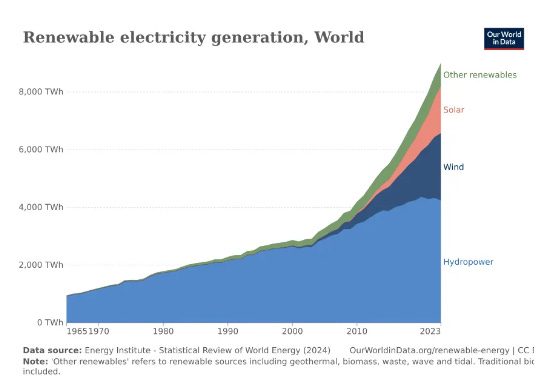
There are several aspects of this growth that must be kept in mind while considering whether this and a massive scaling up of these products is actually ‘beneficial’ to humanity and our planet or not.
From a relatively narrow ‘economic/financial’ point of view, especially as it pertains to individuals and families that depend upon employment income to ‘survive’, growing employment opportunities are fantastic. And for the local to national (even global) economists and politicians that signal their ‘success’ via indicators such as gross domestic product (GDP) and employment statistics, any economic growth is a benefit and must be pursued!
Such wealth ‘creation’ is particularly a motivating factor for the industrialists and ruling elite, who not only push persistently the pursuit of the infinite growth chalice but who have experienced a significant burgeoning of their personal/family wealth over the past few decades. So much so that they are leaving the masses well in the dust in terms of ‘income’, especially in the United States and China where close to half of the world’s wealth is concentrated (see graphic above). Coincidence? I think not.
Leaving aside the significant growth in inequality between the uber-wealthy and the hoi polloi that has accompanied global wealth production, the mythology that has been created surrounding the economic growth imperative is powerful. In fact, it may be one of, if not the most powerful to hold sway in our modern world zeitgeist. Within that worldview such growth is primarily perceived as only of benefit with economic contraction being seen as the most significant thing we must avoid at all costs.
Those ‘costs’, however, tend to be at the expense of the health of our planet’s ecosystems–among other negative aspects (especially socioeconomic disparity) that get left unsaid or rationalised away by our world ‘leaders’ when discussing the growth imperative and/or marketing their latest ‘solely beneficial’ policies. The graphic above shows the almost perfect correlation between the global material footprint (i.e., raw material extraction) and GDP. If one defines wealth generation via GDP, then it would appear that any increase in this metric coincides almost precisely with resource extraction–one of perhaps the most ecologically-destructive activities our species carries out.
Here I must ask critically: Is this really what we want for a species seemingly already well into ecological overshoot (due primarily to our expansion and its material-based requirements) and a planet experiencing the negative consequences of this overshoot, especially a loss of biosphere integrity, changes in freshwater, novel entity dispersal, etc.? When money/wealth–which are potential claims on future resources and their extraction, especially energy–is ‘created’, there is also created more resource extraction, refinement, and industrial production of some nature. More wealth = more ecosystem destruction. (see graphic above showing the material footprint relationship with GDP)
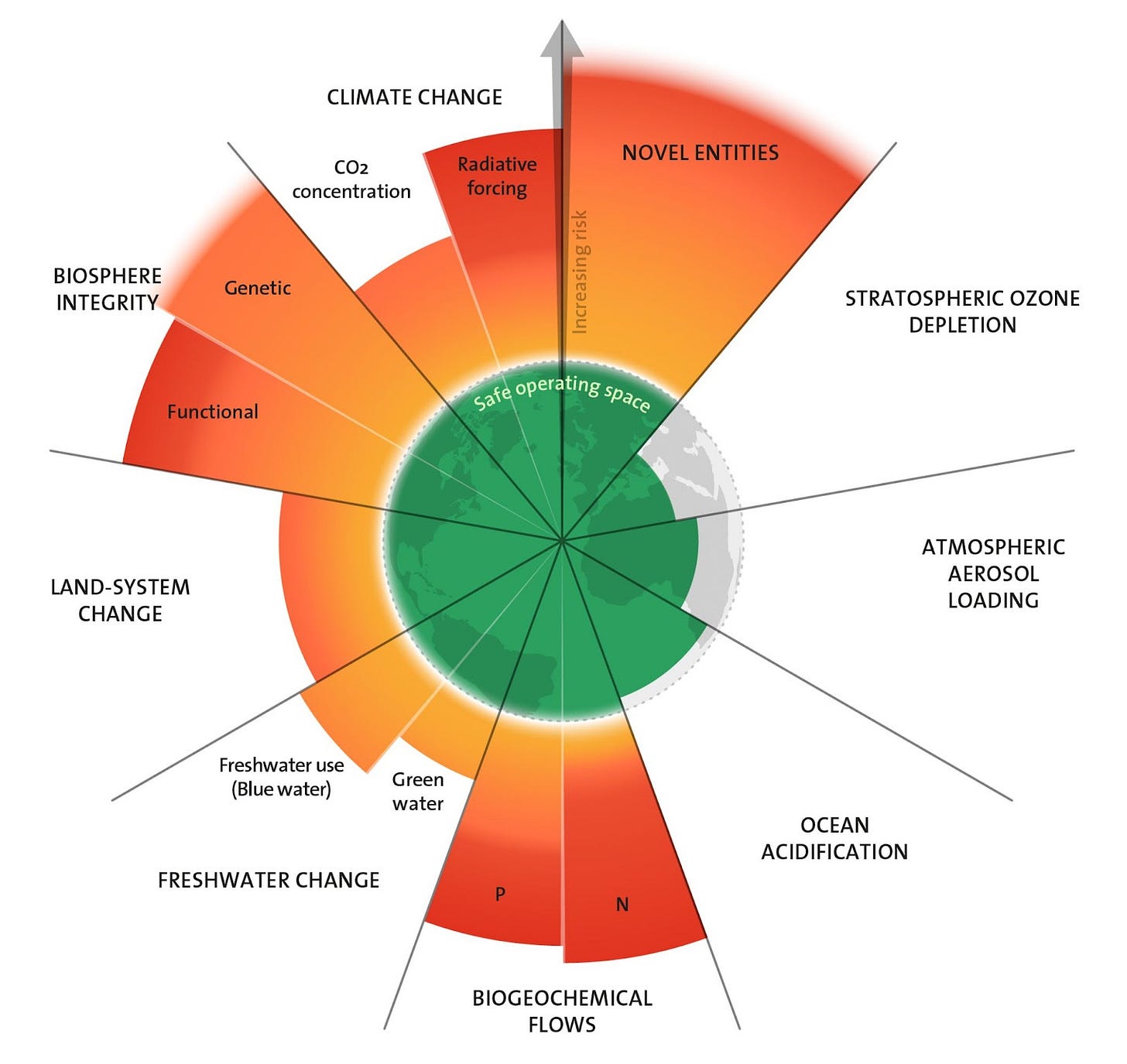
While wealth generation (especially through job creation) appeals greatly to the masses who hold out hope of achieving financial ‘prosperity’ through gainful employment, the illusory narrative about ever-greater prosperity for all seems to me to be mostly about sustaining the unsustainable and ensuring continued exploitation of our planet and continuing ecosystem destruction–and mostly for the benefit of those at the top of our power and wealth structures given that wealth tends to accrue extremely unevenly towards that class of our rather hierarchical complex societies.
So, the creation of evermore ‘wealth’ (via additional units of currency) added to our economies becomes ever-increasing potential claims on future energy and other finite resources (with their extraction and refinement requiring significantly ecologically-destructive processes). How is this in any way, shape, or form ‘beneficial’ except, and particularly for, the ruling elite who own and control the industries and resource lands that are supposedly generating ‘wealth’?
This is a troubling narrative for ‘renewables’ cheerleaders in the sense that the primary motivation given for transitioning to ‘renewables’ has been and continues to be one of reducing the negative consequences on the planet’s ecosystems of hydrocarbon use–especially the greenhouse gas emissions, particularly carbon.
But as I have argued and is perhaps the most obvious misinformed assertion, the continued and/or expanded pursuit of ‘renewables’ actually exacerbates the negative impacts on ecosystems due primarily to the extractive and industrial industries required for their production. How is this not recognised by those arguing in favour of the mass production of these industrial technologies?
In addition, I and others have tried to point out that the production of ‘renewables’ has been additive to our energy mix and serves to exacerbate our overshoot predicament. While the ‘renewables’ advocates often highlight the growing share of electrical-energy production these mass-produced industrial products provide, they leave out of any calculation the growth in electrical generation via hydrocarbons (especially coal)–particularly in those nations where much of the globe’s industrial production is carried out.
For example, in a recent post in the Facebook Group Peak Oil–Twilight of the Oil Age, a member highlighted a CarbonBrief article that focuses upon the plateauing of CO2 emissions in China and suggests that this ‘pause’ is directly due to the mass roll-out of ‘renewables’. Several members of the group challenged this interpretation, suggesting instead that it indicates an economic slowdown and has not been the result of ‘renewables’ being mass produced and adopted. What I pointed out was the additive nature of these technologies to China’s electrical energy production and that while China has been increasing their ‘renewables’, they have also been increasing their hydrocarbon-based electricity generation–reaching record levels (see graphic below).
And while China may indeed be experiencing an exponential increase in ‘renewables’ compared to hydrocarbon use, this is not unusual when a technology is in its infancy. The rate of growth is almost always larger when the base numbers are small. The point, however, remains: ‘renewables’ are adding to China’s energy mix and replacing little if any of that provided by hydrocarbons. This is true also for the world as a whole: ‘renewables’ are adding to the energy production and use by our species.
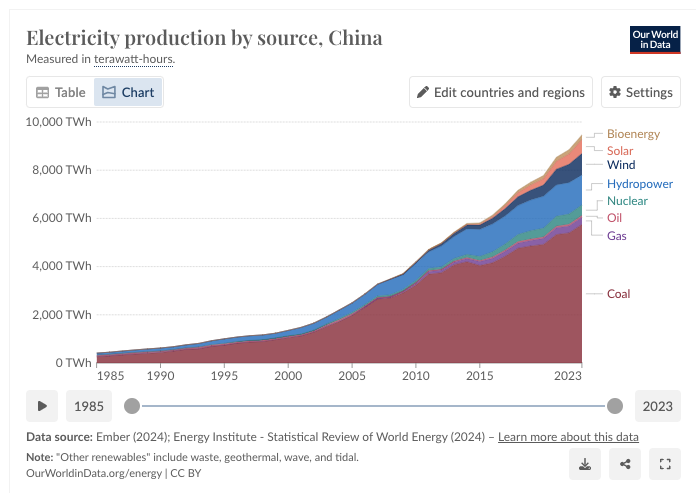
As for expanding or maintaining our financial and economic systems as constructed, these are among the most-impactful human systems that contribute to our continuing degradation of our planet and its ecosystems.
While the economic argument appeals to many (most?) and is often used by those pushing any number of agendas (especially the pursuit of the infinite growth chalice via economic expansion), it is probably the exact opposite of the trajectory our species needs to follow if we wish to focus upon long-term sustainability (or, at least attempt to mitigate somewhat the fallout of ecological overshoot). Degrowing these systems and the extractive and industrial processes they rest upon should be our primary ideology, not expanding them.
With ‘wealth’ (in the form of currency/money) being a potential claim on future resources (especially energy), the expansion of ‘renewables’ being called for necessitates destructive extraction processes to continue and grow substantially. Is this not paradoxical to the supposed reason for pursuing ‘renewables’? Are we having to destroy the planet to save it?
In the mind of many ‘renewables’ supporters it seems this paradox is ignored or rationalised away. They maintain such destruction is a ‘one-off’ or not anywhere near the negative impacts that hydrocarbons bring to the table (again, ignoring the hydrocarbon inputs into ‘renewables’).
Where is the alternative of halting our pursuit of the perpetual growth chalice or even reversing it via degrowth? It would seem to me that even the discussion of halting growth is mostly verboten in the public sphere except amongst a somewhat marginalised minority–who are often vilified by the perpetual-growth believers. The myth of infinite growth on a finite planet is not only alive and well but vociferously protected by its gatekeepers and adherents. The force shall not be disturbed.

These are not the droids you’re looking for…
As I stated to one of the ‘renewables’ advocates–whom I’ve had ongoing disagreement with over this issue–when I shared the arguments made by those who disagree with their positive assessment of ‘renewables’ (and who countered that all of the critics are obsolete thinkers, haven’t updated their knowledge, have not taken account of new data, and are simply old dogs who can’t learn new tricks): it could be that “the evidence points to a very different conclusion for those scientists/researchers. One of the perhaps most important learnings of my extended post-secondary education was that even the exact same observable ‘facts’ can be interpreted in very different ways; sometimes ways that are diametrically opposed.”1
We all believe what we want to believe, regardless of ‘facts’. For die-hard ‘renewables’ cheerleaders, the negative aspects will mostly be denied/ignored/rationalised away–a response entirely encouraged by the marketers of these technologies. They cannot see (for reasons perhaps of cognitive-dissonance reduction) that these industrial products carry with them exceedingly non-beneficial consequences. They accept, usually without question, the ‘solely beneficial’ assertions made by the products’ manufacturers and the echo chamber of supporters.
One of the aspects that gets lost in this mythos, unfortunately, is the larger issue of societal sustainability–or should I say unsustainability and the evidence suggesting that by pursuing these industrial technologies we are adding fuel to the fire and exacerbating the fundamental predicament of ecological overshoot, making any possible and marginal mitigations all the less likely to be helpful for our species (or any and all non-human ones and the ecosystems humans depend upon for their very existence).
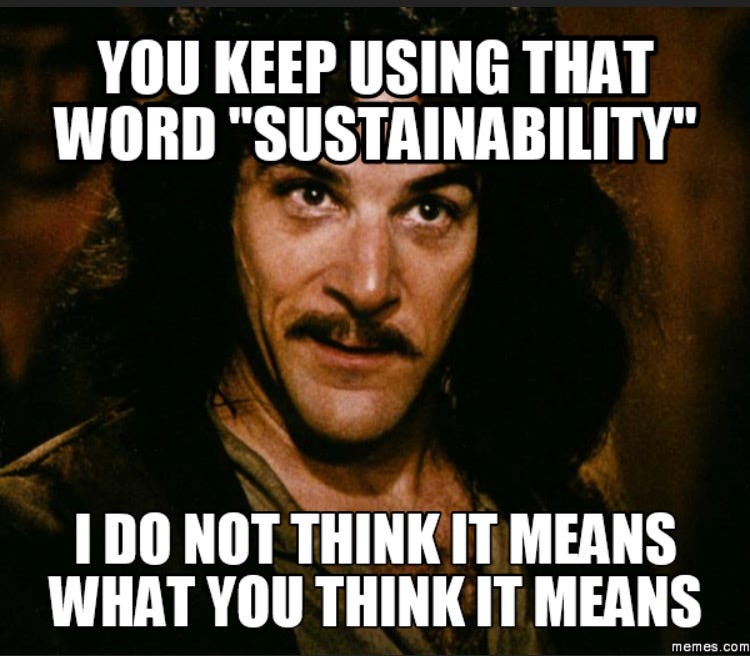
And this is especially true for analyses that focus on singular and/or narrow aspects such as carbon emissions or energy-return-on-energy-invested (EROEI); the latter of which can be useful (if agreement can be had over how to calculate/measure it) in evaluating energy ‘costs’ but tend to ignore completely the environmental/ecological and/or societal ‘costs’. Just because something may appear to be capable of supporting the energy ‘needs’ of industrial society (at least for a relatively short-term duration), does not mean its use is ecologically justifiable. A societal-supporting energy source can (and probably does) carry great ecologically-destructive ‘costs’ with it but is left out of an EROEI calculation.
When I raise such issues as the environmental costs of ‘renewables’, the tendency of advocates has been to either ignore my concern completely or simply rebut that the costs of hydrocarbons are much worse, and we need to reduce carbon emissions regardless of all other ‘costs’.
Without getting deeply into the carbon tunnel vision such rebuttals raise, ignoring all the other negative aspects of ‘renewables’ is highly dangerous in my opinion.
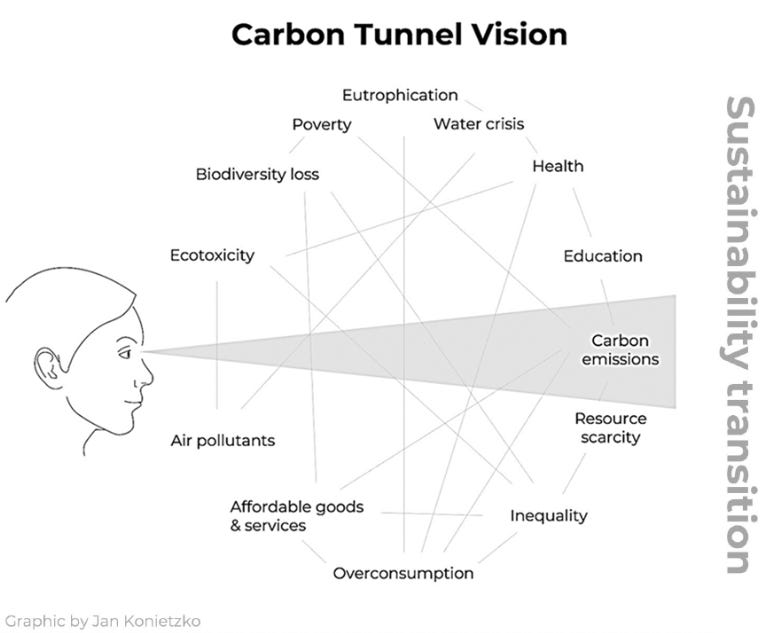
Such responses, however, are not surprising given another argument that is often made by those supporting the widespread use and distribution of ‘renewables’: we need to do something! And that ‘something’ is almost invariably more technology. But maybe we shouldn’t be attempting to sustain the unsustainable via industrial products. Maybe the only thing we need to be doing is deconstructing complex societies, not chasing the (impossible) dream of techno-utopia.
I find the entire narrative surrounding the ‘electrify everything’ mantra faulty–from top to bottom. From the energy-harvesting technologies to the products that would be powered by the stored power. None of it is ‘green/clean’ nor ‘sustainable’. Such claims are little more than marketing propaganda that has been turned into a mythology that cannot be questioned nor criticised.
Mythologies arise to try and help humans explain observed phenomena, and other complex societal issues in a relatively simplistic fashion. Those that meet this need (and especially if they appeal to broader wants/wishes/desires) tend to propagate through a society and become somewhat entrenched, oftentimes providing moral guidance.
It is difficult if not impossible to dethrone mythologies that have become rooted in a society, especially if they tend to alleviate powerful, anxiety-provoking thoughts–such as our complex societies are not sustainable and are actually destroying the ecosystems that we ultimately depend upon for our existence.
Creating a mythology about a product is one of many marketing strategies that seek to resonate with consumers and produce ‘brand’ loyalty. That ‘renewables’ are ‘clean’, ‘green’, and/or ‘sustainable’ are amongst the myths marketers have focused upon to sell their product. It resonates with consumers who recognise/acknowledge the impacts human society has upon our environment and allows them to reduce any cognitive dissonance that may arise. And for the majority that accept the narrative, it creates a sense of shared belief and identity: we, the ‘renewables’ advocates, care deeply about our world and support this industrial product as a ‘solution’ to human destructiveness–and those who challenge our mythos are part of an uncaring ‘other’ who must be silenced.
The myths that have arisen with regard to an energy ‘transition’ are another in a long line of stories told to soothe the savage beast that is Homo sapiens. In this vein, it is successful for the most part: there are a large number of people that believe the claims made about ‘renewables’ without question. But as with the many mythologies that exist and have preceded this one, when one digs below the surface claims the narrative is simple, inaccurate, and misleads.
Want to purchase an electric vehicle or put solar panels up on your property? By all means, do so but please don’t tell me, others, or yourself that you are doing it for any of the so-called ‘benefits’ that cheerleaders of these industrial products go on about–especially their marketers. That’s simply disingenuous.
‘Renewables’ are no ‘solution’ to our various predicaments. The idea that they are is part of a grand lie. A lie that ignores/denies/rationalises away all the glaring negative aspects that accompany them. The lie is readily accepted since it aids the story-telling apes who strive to avoid/reduce significant anxiety-provoking thoughts but it also adds to the height of the cliff directly ahead that our species is running full-steam towards, with the ‘leaders’ (who are actually at the back of the pack but projecting an air of ‘stewardship’ and ‘guidance’) urging on the masses…

As I did with Part 1, I will close with a passage from Charles Hugh Smith in a recent post on the various mythologies our societies hold with respect to technology, political institutions, and financial markets and their ‘ability’ to ‘solve’ all ‘problems’:
“We know we’ve entered the realm of mythologies when expressing doubts about the efficacy of tech, the market or the state unleashes an infuriated indignation that the gods of tech, the market and the state are being questioned, even as the proof of their powers are everywhere.
But once we’re embedded in a mythological structure, then we see play-acting as a legitimate solution.
Here is the real-world situation, stripped of mythology and play-acting: the majority of the core problems are either made worse by tech, the market and the state–Anit-Progress writ large–or they’re beyond the reach of these conventional tools.
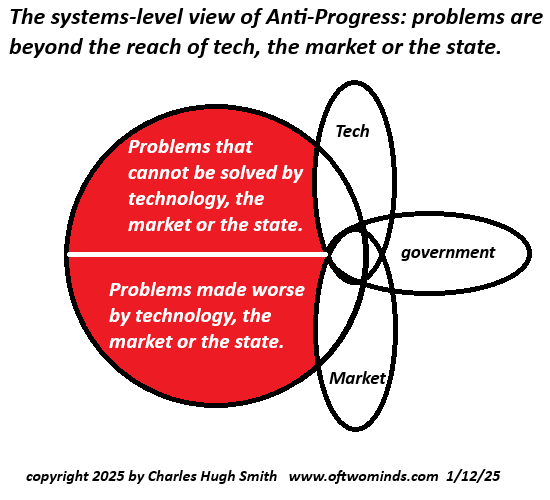
This Venn diagram causes howls of protest and shrieks of agony: how dare you! Of course there are tech solutions, market solutions and government solutions to every problem under the sun. What else is there?
To state this out loud is deeply offensive, for we’ve been trained to worship at the altars of technology, the market and the state. It’s considered good sport to deride the limits of state solutions, but it’s anathema to question the limits of technology or the market.”
Recent Articles of Interest
Nevada’s Joshua Trees Bulldozed In Mesquite; Solar Company Defends Solar Farm
This Poet and Tribal Attorney is Being Sued by a Mining Company
Nickel Mines Threaten Indonesia Nomadic Tribes and Forests
Devil’s in the Machine–Driving Electric Car Fake Environmentalism
A Reality Check On Our Energy Transition
Europe: The Fall of the Holy Renewable Empire
‘Green’ Scottish Ferry Emits Far More CO2 Than Old Diesel Ship
Rare Earth Mining In Myanmar’s Chipwi Region Causes Socioeconomic Decline and Environmental Damage
Desert Tortoises Endangered by Approval of Rough Hat Clark Solar Project
Greenland’s Melting Ice Is Clearing the Way For a Mineral Gold Rush
Questioning lithium-ion batteries, fire risks & hydrating dry regions
When Renewables Meet Their Limits to Growth
What is going to be my standard WARNING/ADVICE going forward and that I have reiterated in various ways before this:
“Only time will tell how this all unfolds but there’s nothing wrong with preparing for the worst by ‘collapsing now to avoid the rush’ and pursuing self-sufficiency. By this I mean removing as many dependencies on the Matrix as is possible and making do, locally. And if one can do this without negative impacts upon our fragile ecosystems or do so while creating more resilient ecosystems, all the better.
Building community (maybe even just household) resilience to as high a level as possible seems prudent given the uncertainties of an unpredictable future. There’s no guarantee it will ensure ‘recovery’ after a significant societal stressor/shock but it should increase the probability of it and that, perhaps, is all we can ‘hope’ for from its pursuit.
If you have arrived here and get something out of my writing, please consider ordering the trilogy of my ‘fictional’ novel series, Olduvai (PDF files; only $9.99 Canadian), via my website or the link below — the ‘profits’ of which help me to keep my internet presence alive and first book available in print (and is available via various online retailers).
Attempting a new payment system as I am contemplating shutting down my site in the future (given the ever-increasing costs to keep it running).
If you are interested in purchasing any of the 3 books individually or the trilogy, please try the link below indicating which book(s) you are purchasing.
Costs (Canadian dollars):
Book 1: $2.99
Book 2: $3.89
Book 3: $3.89
Trilogy: $9.99
Feel free to throw in a ‘tip’ on top of the base cost if you wish; perhaps by paying in U.S. dollars instead of Canadian. Every few cents/dollars helps…
https://paypal.me/olduvaitrilogy?country.x=CA&locale.x=en_US
If you do not hear from me within 48 hours or you are having trouble with the system, please email me: olduvaitrilogy@gmail.com.
You can also find a variety of resources, particularly my summary notes for a handful of texts, especially William Catton’s Overshoot and Joseph Tainter’s Collapse of Complex Societies: see here.
AND
Released September 30, 2024
It Bears Repeating: Best Of…Volume 2
A compilation of writers focused on the nexus of limits to growth, energy, and ecological overshoot.
With a Foreword by Erik Michaels and Afterword by Dr. Guy McPherson, authors include: Dr. Peter A Victor, George Tsakraklides, Charles Hugh Smith, Dr. Tony Povilitis, Jordan Perry, Matt Orsagh, Justin McAffee, Jack Lowe, The Honest Sorcerer, Fast Eddy, Will Falk, Dr. Ugo Bardi, and Steve Bull.
The document is not a guided narrative towards a singular or overarching message; except, perhaps, that we are in a predicament of our own making with a far more chaotic future ahead of us than most imagine–and most certainly than what mainstream media/politics would have us believe.
Click here to access the document as a PDF file, free to download.
I came to this observation after several years of interest in and extensive reading about hominid evolution, especially the physical markers that appear in skeletal remains. The exact same physical attribute was often perceived by different researchers in very different ways that resulted in very different interpretations as to the importance and meaning of the identified characteristic. And then there was the presentation by the university’s psychology department on human intelligence I sat in on where the guest professor began the gathering by asking the participants to consider that if one asks 100 psychologists the meaning of intelligence, you will likely get more than 100 different responses with each highlighting different aspects and resulting in different conclusions even using the same data. The point being that we see and interpret the world in a variety of ways that can sometimes be quite different from each other.
